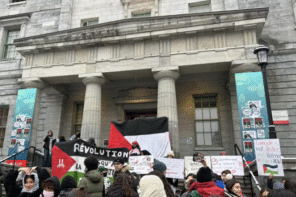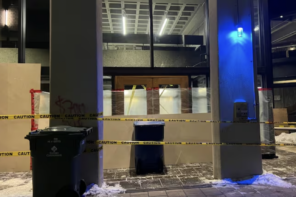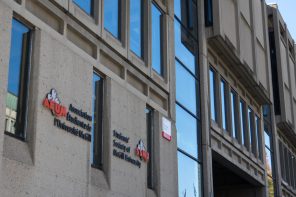GA discussed frosh’s $20,000 deficit, new Student Run Cafe
On Wednesday, SSMU held its second General Assembly of the fall in the Shatner Building. The regularly scheduled assembly in October failed to reach the 100 student quorum required for it to pass motions, creating the need for a second.
While official attendance figures were not announced, the GA exceeded the 100 attendees required for quorum. However, all decisions made at the GA are tentative subject to online ratification, following a resolution that passed in SSMU’s GA last spring.
The assembly progressed very quickly. Once the assembly had been called to order, a motion to approve the agenda was announced, seconded and unanimously passed in what felt like a matter of seconds.
The first item on the agenda was approving the new board of directors. A motion to do so was brought forward in October, but could not be acted on because of a failure to reach quorum. Without an approved board of directors, SSMU was unable to do some of its tasks and duties. The motion was passed with none opposed and only one abstention. Had quorum not been reached Wednesday, there was a risk that SSMU would be unable to renew the liquor license for the Gerts Student Bar.
Next, a vote was taken on whether to retain RSM Richter, SSMU’s auditing firm, for the rest of Fiscal Year 2014. This motion was also passed with a large majority.
During question period, RSM Richter came up again in relation to the $20,000 deficit that SSMU ran during Frosh. One student raised the question of the missing money. “Who was responsible for the $20,000 that was lost from frosh,” he asked, “and why hasn’t there been a clear explanation on this?”
While the question was posed to VP Finance Tyler Hofmeister, Hofmeister passed the explanation to Brian Farnan, SSMU VP Internal.
“What actually happened was that there were some budgeting mistakes,” Farnan explained. “A portion of money made through frosh goes to Paypal, and this was not properly accounted for in the budgeting process. Secondly, with regards to sponsorships, certain mistakes were made in accounting for what was taxable and what was not. In addition, a brand new system was implemented that split up sponsorship revenues between faculties this year.”
Farnan also blamed the launching of about a dozen new initiatives for the confusion in managing frosh’s “large and conservative budget.’
“Going forward next year, we’ve decided that frosh is going to be put into the hands of accounting. This was because of mistakes in budgeting. Our goal is to involve the accounting firm because it is such a huge budget. $200,000 can’t just be handled by students anymore.”
Once the two motions had been voted on, Josh Redel came forward to detail the status of the Student Run Cafe (SRC) to the assembly. Formerly President of SSMU, Redel is currently the manager for the new cafe, which opens in the SSMU building next semester.
“We are currently in phase two of three phases,” said Redel, “phase one being the case competition that took place two years ago, and last year’s market research and internal research that happened with the operation and planning campaign. What we’re looking for in the future in phase three is a huge expansion of space. To really be the hub for sustainable food services in this building.”
The case competition Redel refers to was started in March 2011. It allowed students to present proposals for how to make the new cafe sustainable. While, these ideas will not be implemented on opening, Redel says SSMU will fit them into the discussion as the SRC develops.
The SRC is taking the space of Lola Rosa Express on the second floor of the SSMU building. The location was chosen partially out of convenience and partially out of desire for growing room. At its inception, the cafe will simply be a food counter, while the rest of the space will be developed later.
“We chose the space because it provides us a really unique opportunity. It has equipment there that belongs to SSMU, it has a food counter, it has electricity, plumbing and gas. It gives us the opportunity to try our models without having to put in a huge investment cost and renovating an entire space.”
The staff for the SRC has already been chosen. The “Student Run” aspect of the cafe means that all the positions will be filled by students. “We have four positions, all of which will be students. There’s the manager – myself, head chef, chef and cashiers. All will be paid positions.”
SSMU has already sorted out the sourcing for the cafe’s menu, which it expects to release in the coming days. After considerable discussion, including during last years election debates, SSMU has decided that the cafe will serve meat. However, Redel guaranteed that the SRC would offer “at least one, if not two vegetarian, vegan silica and gluten-free options.”
Redel also added that the menu was designed to not compete with some food options already run by various faculties on campus. “We did a market analysis and determined who we should and should not be competing with. The menu is designed not to compete with the food options on campus that are student run.”
Apologizing for using “a bunch of buzzwords,” Redel described the SRC’s mission as achieving triple bottom line sustainability. “It’s going to be financially sustainable, socially equitable and environmentally sustainable. We’re hoping to get closer to this balance because we are student run.”
The SRC will be having informal feedback sessions on Wednesday the 20th, Tuesday the 26th, and Friday the 29th to hear from students. Details on location and timing will be announced on the SRC blog at http://ssmu.mcgill.ca/cafe/blog/.
“This is a big conversation,” Redel noted. “We hope everyone participates in it over the coming months and years.”








